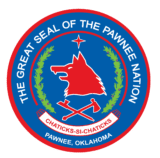PAWNEE RESERVE, Okla. — On December 3, 2024, the Pawnee Business Council (PBC) met for a Special Meeting and approved an additional allocation from the American Rescue Plan Act (ARPA) for Pawnee Nation (PN) Elders 65 and over.

The intent of the Food Insecurity assistance is to help cover any food related expenses Pawnee elders might incur due to the holiday season.
In an announcement to the Pawnee Nation on December 4th, Madame President Misty M. Nuttle wrote, “We realize most elderly citizens are on a limited or fixed income. This additional allocation will be the last assistance provided from these funds as 2025 is the final year to expend any and all allocations from this special funding. These specific checks will expire 90 days from the date of the check.”
According to the United States Department of Treasury, this means that tribes must legally commit all their allocated ARPA funds for specific projects and expenditures by December 31, 2024.
Madame President went on to write, “The Pawnee Business Council continues to hold our elders in a special place of respect and remembrance. We truly hope you enjoy your time with loved ones near and far and you all have a safe holiday season.”
Help us defend tribal sovereignty.
At Native News Online, our mission is rooted in telling the stories that strengthen sovereignty and uplift Indigenous voices — not just at year’s end, but every single day.
Because of your generosity last year, we were able to keep our reporters on the ground in tribal communities, at national gatherings and in the halls of Congress — covering the issues that matter most to Indian Country: sovereignty, culture, education, health and economic opportunity.
That support sustained us through a tough year in 2025. Now, as we look to the year ahead, we need your help right now to ensure warrior journalism remains strong — reporting that defends tribal sovereignty, amplifies Native truth, and holds power accountable.
 The stakes couldn't be higher. Your support keeps Native voices heard, Native stories told and Native sovereignty defended.
The stakes couldn't be higher. Your support keeps Native voices heard, Native stories told and Native sovereignty defended.
Stand with Warrior Journalism today.
Levi Rickert (Potawatomi), Editor & Publisher
